Let's go to Granada
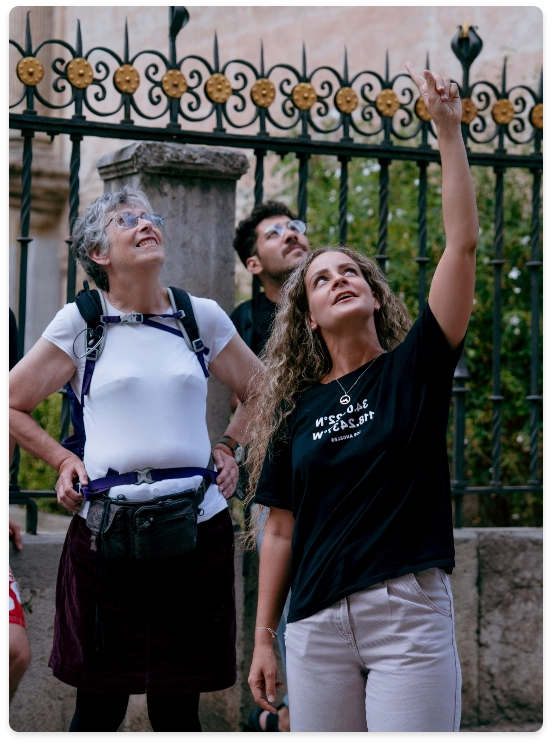
Granada is a modern capital
With 270.000 inhabitants Granada is the capital of the province of the same name and is the home of one of the greatest universities in Spain, founded by Charles V in 1526. More than 60.000 students make an exciting contribution to the city, especially to its nightlife. Cafes, pubs, bars, restaurants, terraces and a huge variety of free tapas can be found in every street.
Some of Granada’s many cultural activities include the International Theatre Festival, Tango Festival, International Jazz Festival, the Manuel de Falla Auditorium’s annual programme, Flamenco Festivals and the International Music and Dance Festival. The most famous celebrations are: Easter Week, The Day of the Cross (May), Granada Fair (June) and the Zaidín Festival. See Celebrations in Granada for a full list of celebrations.
Plaza Nueva is located close to numerous specialist Arab shops. Granada has played an important role in the most spectacular chapters of Spanish history. Arab dominance in the city dramatically influenced its culture and created one of the world´s most precious and unique monuments: the Alhambra and Generalife. The Renaissance left its mark with the Cathedral, the Capilla Real, (where the Catholic King and Queen are buried), La Cartuja, the Monasterio de San Jerónimo and numerous churches and palaces.
The Albayzin, the oldest quarter of Granada, stretches over the hill opposite the Alhambra. Narrow, cobbled streets rise and fall leading to small squares, caves or beautiful viewpoints of the Alhambra, white houses with patios or gardens, fountains, and Arab houses with a Mediterranean flavour.
Visit the heart of Flamenco in the caves of Sacromonte where the Gypsies live; the Jewish quarter; the Realejo and the Alcaicería, an Arab bazaar with Moorish arches and marble columns. Enjoy the busy Plaza Nueva and the terraces of El Paseo de los Tristes, situated at the foot of the Alhambra hill.
Granada has an ideal geographical location. You can contemplate the snow-covered summits of the Sierra Nevada (the ski resort of Pradollano – November until April – is just 33 km. from Granada) or the rich, green countryside of the Vega. You can stroll along the footpaths of the Alpujarras, see the cave-houses of Guadix, pay a visit to Sevilla or Málaga, or enjoy The Costa Tropical.
Language school in the centre of town.
Escuela Delengua is situated in the heart of Granada, very close to the Cathedral, beside Plaza Nueva, at the foot of the Albayzín.
Average Prices in Granada
Here is a list of the average prices in Granada. It should help you plan your budget while you study Spanish in Granada. Please bear in mind that these are just a guide and that prices do fluctuate throughout the city.
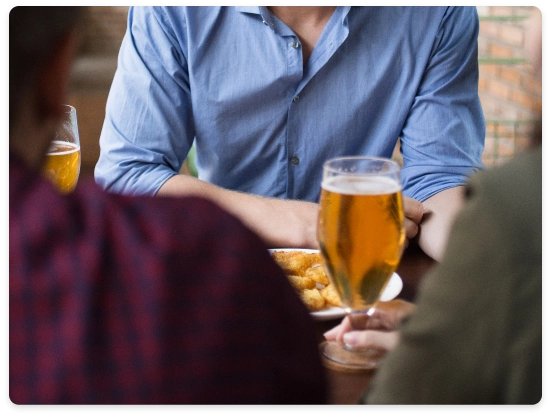
• Beer in a bar(+free tapas): 1,80 – 2,50 EUR
• Entrance to a club (normally includes a free drink): 8,00 EUR
• A glass of wine in a bar: 2,20 – 3,00 EUR
• Ticket for the cinema: 5,00 – 6,00 EUR (miércoles: 4,00 EUR)
• Ticket for the bus (cheaper bus passes are also available): 1,40 EUR
• Bottle of wine (1 litre): 2,00 – 6,00 EUR
• A bottle of beer (one litre): 1,10 EUR
• A bottle of water (two litres): 0,40 EUR
• A baguette: 0,70 EUR
• A carton of milk: 0,90 EUR
• A cup of coffee/tea: 1,20 EUR
• A piece of toast: 1,00 EUR
• Ice-cream: 2,00 – 3,00 EUR
• A sandwich: 3,00 – 4,00 EUR
• Spanish Menu of the Day (3 course meal): 8,00 – 12,00 EUR
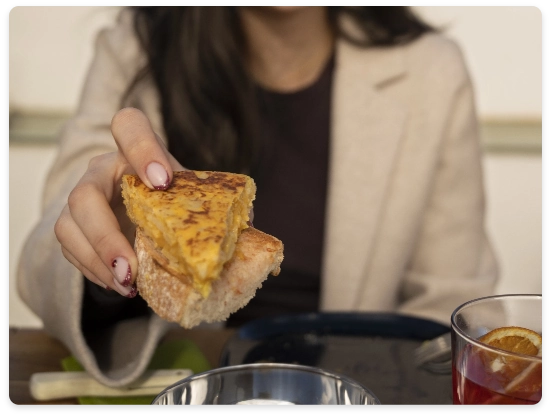
Join Granada for the Celebrations...
Scroll down to see all the Fiestas that you can enjoy in Granada.
The 1st January: New year’s Day
The 2nd of January: Catholic conquest
People from Granada celebrate the capture of the city by the Catholic Kings. The youngest councillor holds the standard of Castile and greets the people from the balcony of the Consistorio. A civic procession also takes place in the city, during which the standard of the Catholic Kings is shown along with the coat of arms of Granada. The celebration has been going on since the death of Ferdinand the Catholic King. Without any doubt this is one of Granada´s most traditional celebrations.
The 5th of January: The 3 wise men in Granada
On the night of the 5th, there is a big procession through the city and The Three Wise Men on horseback give out sweets to the children of Granada. Children receive presents from ‘The Three Kings’ on this night and it is celebrated more than Christmas.
The 6th of January: The Epiphany
People celebrate the arrival of the 3 Kings to the Nativity, children enjoy playing with the presents that they received the night before and this day is a national holiday.
The 5th of February: Procession from The San Cecilio Abbey
San Cecilio is the local patron saint of Granada and the day is celebrated with processions, dancing and other festivities.
From the 26th February to the 5th of March: Carnival
The yearly carnival is celebrated all over Spain with events like parades, mask and costume parties.
The 28th of February: Andalusia Day in Granada
A state holiday throughout Andalusia to remember that in 1980 people occupied the streets of the city to claim political autonomy and freedom.
Easter in Granada
Easter is one of the most important religious events in Granada, and Spain. It is celebrated with impressive religious processions where statues of Jesus and The Virgin Mary are carried around the town, with music and people dressed in special costumes. One of the most important processions is that of the gypsies of Sacromonte.
Good Friday
People remember the crucifixion and death of Christ
The 1st of May: Labour Day
On the 1st of May 1886 the Labour Union of Chicago organized a strike to establish an 8 hour working day.
The 3rd of May: Day of the Cross
This day is celebrated in Granada with competitions: for example, who can decorate the most beautiful cross. It is a local holiday. Granada lights up during this celebration, wine, tapas and Sevillanas dancing are the real stars of the party.
The 26th of May: Mariana Pineda
Mariana Pineda was a revolutionary from Granada who was sentenced to death by King Fernando VII. The day is celebrated on the Mariana Pineda central square but is not a holiday.
Corpus Christi Fair
Corpus Christi as a religious festival is celebrated with church services and processions. In Granada, a Summer Fair takes place over the week of Corpus Christi, when popular entertainments tend to eclipse those of the church. “Casetas” or marquees are set up in the historic centre of the city where there is music, food and drink available, especially at night. There are religious processions on Corpus Christi Day, but the majority of the action takes place in fairgrounds near the edge of the city.
The 28th of June: San Pedro, in the Albaicín.
The romeros go up to the Ermita de San Miguel riding horses or travelling in decorated carts. This event is celebrated with artists from all over Europe. It is a superb event that takes place in a variety of amazing locations, such as the Alhambra and the open-air theatre in the Generalife gardens.
The 15th of August : The Assumption
People celebrate the assumption of Mary into Heaven. They celebrate with processions and by donating flowers to the virgin.
The 15th and the 24th of September: Feast of Our Lady of the Angustias
This is the Patron Saint of Granada and the people of Granada offer flowers to the Virgin. The central event is the procession of the Virgin, which is accompanied by a traditional market where autumn fruits and olive oil biscuits are sold.
From the 23rd to the 30th of September: San Miguel
This fiesta is celebrated during the whole weekend with music and dance concerts, fireworks and a football tournament.
The 12th of October: National Spain Day.
A date that commemorates the discovery of America by Cristobal Colón (Christopher Columbus) in 1492, which became the National Day of Spain.
The 1st of November: All Saints Day in Granada
The Church wanted to remind people that there are many important Saints whose names or feast days do not appear in the calendar. This day is to remember all those Saints.
The 6th of December: Constitution Day in Granada
People celebrate the rectification of the Constitution.
The 8th of December: The Immaculate Conception
People celebrate the Virgin and the Immaculate Conception.
The 25th of December: Christmas in Granada
People celebrate the birth of Jesus.
The 31st of December: New Year’s Eve in Granada
At midnight Spanish people gather in the Town Hall square to eat twelve grapes precisely at the stroke of midnight one after another. The party goes on all night long.
How to get here
Discover the options to get to Granada quickly and comfortably, either by plane, car, train or bus. Our city is well connected to facilitate your trip.
Vueling, Iberia, Air Europa, EasyJet and British Airways fly regularly to Granada airport. There are also daily flights to/from Madrid and Barcelona, and from there to all major international airports.
You can also fly to/from Malaga and Almeria airports (EasyJet, Hapagfly, Ryanair, AirBerlin, Vueling, Helvetic, Flybe, etc.). Malaga and Almeria are only one hour and 45 minutes from Granada by bus. They are bigger airports so are connected with the most important international airports. For further information see Flights to Granada.

From/via Madrid is the best train route to Granada.
Trainline: the most popular app in Europe to travel by train and bus.
Along the coast, from Barcelona, you can take the AP7 motorway (with toll) to Alicante and then the A-92 motorway (free) to Granada.
From Madrid take the A-4 motorway to Jaén, and then to Granada.
There are some International Coach Services that serve Granada (e.g. SAIA, Mundial). Please check the International Coach Services in your city.
If you are travelling within Spain there are national buses that have daily services to Granada. For example there are scheduled buses (every hour) to Granada from Barcelona, Madrid, Malaga and Almería. Alsina Graells is the most popular bus company in Andalucia and has many routes to/from Granada. National companies like Alsa also travel to/from Granada daily. You can find timetables on their websites.
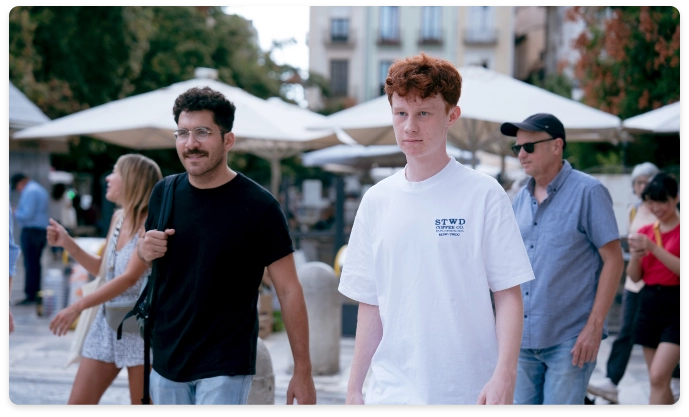
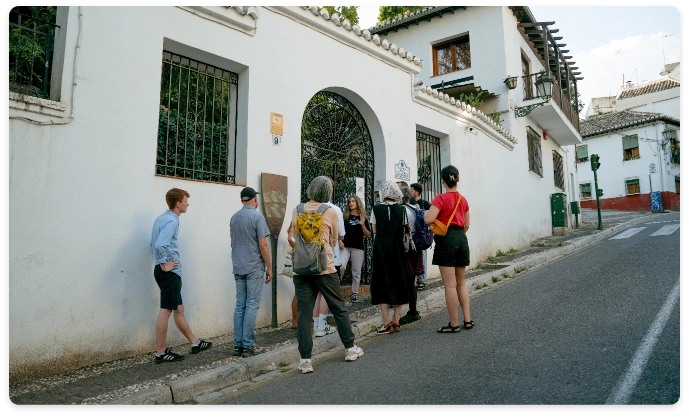
Sustainable Tourism
Being responsible is integral to our role here at Delengua. We try to ensure that each and every student joins us in this objective and actively helps to preserve the environment and support the local community. The local community is very important to our work as we are based in the oldest district of Granada, the Albaicín. We are committed to preserving and supporting our local environment and traditional community. Our school is small and independent and plays a big role in the local community and takes an active part in decision making.
The local community is very important to our work as we are based in the oldest district of Granada, the Albaicín. We are committed to preserving and supporting our local environment and traditional community. Our school is small and independent and plays a big role in the local community and takes an active part in decision making.
Our teachers all locals, and they can, therefore can provide our students with the most in-depth knowledge about Granada and all its history. All of our daily activities are focused around presenting the true history and ethos of Granada and Spain. Not only do we visit most well-known places of interest like the Alhambra or the Cathedral, but we also provide a different view of Granada by visiting guitar makers and potters for example. The activities are integral to our mission in both teaching Spanish and demonstrating the real Granada. We don’t charge for the organisation or the administration of these activities, students only have to pay for entrance fees.



We realise how important tourism is to the local community and to ourselves and so we try to ensure that everyone benefits. This is why we encourage our students to visit the local shops and stores so that they can help the local shop owners and enjoy the local products and produce.
Delengua is a partner of Integra2, a charity that works with teenagers and young immigrants who have recently arrived in Spain with little or no knowledge of Spanish and who therefore have problems integrating. Delengua provides the organisation with teaching materials and support to help these people with their Spanish studies. This is important for us as we can use our main forte to help those in need.
We have a written Code of Conduct for all of our students and teachers. They can refer to this during their stay with us and again when travelling in the future. The Code specifies how they can be responsible and environmentally sustainable. We take this Code very seriously and if our students do at least one thing that is included in the Code then we should make a difference.
We are also partners with the English travel agency “Responsible Travel” We work together to provide sustainable holidays. You can have a look at our policy in this PDF document: Responsible Travel Policy

